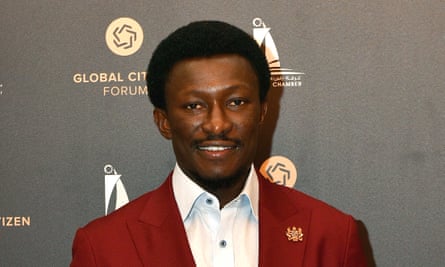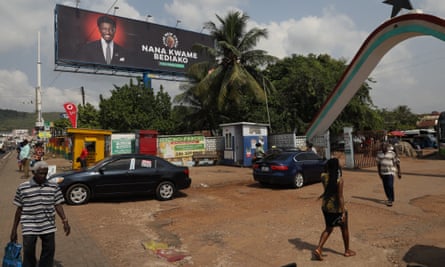It was a bombastic statement from the man who wants to disrupt Ghana’s two-party political scene. “I’m here to represent Africa’s greatest hope,” Nana Kwame Bediako told an audience in a Palace of Westminster committee room in central London in October, referring to younger people on the continent.
After the event, a social media post by Bediako suggested the trip had involved a presentation in parliament itself, rather than an address to a committee room.
Taken together, the trip and its somewhat loose framing were typical of the 44-year-old’s unorthodox run for the presidency in elections that are being held on 7 December.
Bediako had arrived on the political scene earlier this year when he revealed himself as the man behind the mysterious, masked figure who was appearing on billboards across the country.
Already a well-known businessman, he is running as an independent candidate with the backing of New Force Movement, a party he has set up to support his attempt. Though seen as a long-shot candidate, his campaign, which echoes the pan-Africanism of the country’s first leader, Kwame Nkrumah, is credited with tapping into the aspirations of younger voters in a country where the median age is 21.
Asked in an interview with the Guardian in London about his chances of victory, Bediako replied: “It depends what winning means to you. Becoming president is one thing, but I will respect the fact that I’ve been able to unify the mindsets of the people, I call that winning.
“I’ve been able to win the hearts and minds of the youth who are up and coming. I’ve been able to inspire and motivate them, I’ve been able to awaken their spirit.”

George Bob-Milliar, a professor in African studies at Kwame Nkrumah University of Science and Technology in Kumasi, said Bediako had successfully entered “a very free space that allows for popular expressions of people’s aspirations” in Ghana.
Bob-Milliar said Bediako’s “fun” approach and use of technology was resonating with younger people, adding: “If he’s able to deny the two major parties a first-round victory, then he will be in a good position to try and negotiate something for his movement.”
On social media Bediako – also known as Cheddar or Freedom Jacob Caesar – boasts that he is the “prince of the new Africa”. He has been photographed with a lion skin draped around his neck, dressed head to toe in Louis Vuitton, and posing atop a Lamborghini. He has two tigers he imported from Dubai on his Accra property, which a court has ordered be removed.
His policy platform, which includes harnessing national resources, thwarting foreign influence and creating a single African currency, has made headlines. However, Nic Cheeseman, a political scientist and professor at the University of Birmingham, said: “It’s easy to kind of come out and make a big splash and get some attention, but converting that into votes and a sustainable movement and sustainable party is much more challenging.”

The vote is taking place against a backdrop of economic uncertainty in Ghana. Inflation was running at nearly 23% in June, and last year the country received a $3bn IMF bailout.
Bediako, a serial entrepreneur, said his personal wealth was no barrier to understanding his fellow citizens’ struggles. “I’ve climbed the stairs of struggles and I’ve seen the death of corporatism,” he said. “One would have thought that wealth would make it go away, but the sad thing is when you become wealthier, you start to see the struggles of people more than when you were in that space.”
He said his idea to join the presidential race came to him in a dream one early morning. Upon waking, he told his wife he was going to form a political party, become president and eventually lead all of Africa. “She looked at me and she thought I was crazy. I must have been crazy at that very moment,” he said.
Bediako took aim at what he called governance failures at the national level in Ghana. Discipline must come from the top down, starting “from when we are practising democracy in terms of our voting systems”, he said
In 2021, 17.4m bribes were paid in Ghana, according to a UN report, which also found 10.3% of the adult population reported they were offered money in exchange for their vote before or during the 2020 general election.
The Ghanaian economist Theo Acheampong likened Bedkiako to disruptors such as Donald Trump, especially in his use of social media to reach untapped voters. “He’s not necessarily going to win,” Acheampong said. “However, he doesn’t have to win, all he has to do is disrupt the election.”
Source: theguardian.com

















